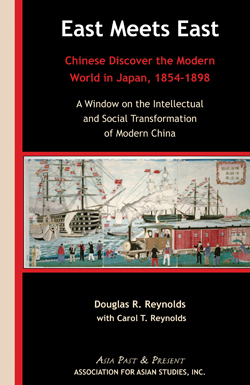New Faculty Publication: East Meets East: Chinese Discover the Modern World in Japan, 1854–1898: A Window on the Intellectual and Social Transformation of Modern China

Department of History professor Douglas R. Reynolds, along with Carol Reynolds, has recently published the book East Meets East: Chinese Discover the Modern World in Japan, 1854–1898: A Window on the Intellectual and Social Transformation of Modern China (2014).
From the publishers’ information:
Through the lives of Chinese diplomats and their careers, East Meets East explores three important dimensions of modern Chinese history: Chinese discovery of the modern world in Japan; reports on Japan suppressed by higher authorities because of their insistent objectivity and non-Sinocentric perspective; and state-sponsored innovations to meet crises which opened the gates to intellectual and social transformations at the grassroots. Meaty reports on Japan directly informed the Hundred Days Reforms of 1898 while, inside China since 1861, extrabureaucratic government Ju (Bureaus)—industrial arsenals, navy yards, translation bureaus and schools, mines, shipping, textiles, telegraphy, and railroads—demanded the talents of “irregular path” (yitu) persons having new knowledge distinct from “regular path” (zhengtu) bureaucrats. Against this background it becomes much clearer why the Xinzheng modernization reforms after 1901 took hold and why after 1912 elites old and new rejected Yuan Shikai’s bid to restore the imperial order in 1915–16. After 1916, there was no going back. The old order and era were truly “gone with the wind.”
Prof. Reynolds specializes in modern Chinese history and teaches courses in all periods of Chinese and Japanese history. He is also the author of the following books:
- China, 1895-1912: State-Sponsored Reforms and China’s Late-Qing Revolution, Selected Essays from Zhongguo Jindai Shi (Modern Chinese history, 1840-1919) (1995; guest editor and translator)
- China, 1898-1912: The Xinzheng Revolution and Japan (1993)
and the following articles:
- “Japanese Encyclopaedias: Their Background and Hidden Impact on Late Qing Chinese Encyclopaedias,” in Chinese Encyclopaedias of New Global Knowledge (1870-1920): Changing Ways of Thought (2014; Milena Doleželová-Velingerová and Rudolf G. Wagner)
- “Japan-China Relations,” in Berkshire Encyclopedia of China (2009; vol. 3, pp. 1196-1201)
- “Christian Mission Schools in Comparative Perspective: A Comparison with Japan’s To-A Dobun Shoin in Shanghai, 1901-1945, and Their Legacies,” in Education, Culture, and Identity in Twentieth-Century China (2001; Glen Peterson, Ruth Hayhoe, and Yongling Lu, eds., pp. 82-108)
- “Training Young China Hands: Toa Dobun Shoin and Its Precursors, 1886-1945,” in The Japanese Informal Empire in China, 1895-1937 (1989; eds. Peter Duus, Ramon H. Myers, and Mark R. Peattie, pp. 210-271). Awarded the 1991 Modern Sino-Japanese Relations Prize of the Association for Asian Studies, administered by the Mid-Atlantic Region, Association for Asian Studies.
- “A Golden Decade Forgotten: Japan-China Relations, 1898-1907,” The Transactions of the Asiatic Society of Japan, fourth series, 2 (1987), 93-153. Awarded the 1988 Modern Sino-Japanese Relations Prize of the Association for Asian Studies, Association for Asian Studies. (Not available at GSU; use Interlibrary Loan to request)
- “Chinese Area Studies in Prewar China: Japan’s Toa Dobun Shoin in Shanghai, 1900-1945,” The Journal of Asian Studies, 45.5 (November 1986), 945-970. One of two publications mentioned in the award letter of the To-A Dobun Shoin Memorial Prize, Tokyo, 1996.